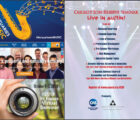 I recently gave a luncheon speech in Montréal at the Actuarial Students’ National Association (ASNA) annual meeting, whose theme was “The Actuary of the Future.” Naturally, I spoke about some of the threats and opportunities facing our profession, but I felt it was also important to stress that much of what experienced actuaries have learned throughout their careers is still relevant to both current and future actuaries. I would like to share some observations on what worked for me in the past and that I believe should continue to work for most actuaries in the future.
I recently gave a luncheon speech in Montréal at the Actuarial Students’ National Association (ASNA) annual meeting, whose theme was “The Actuary of the Future.” Naturally, I spoke about some of the threats and opportunities facing our profession, but I felt it was also important to stress that much of what experienced actuaries have learned throughout their careers is still relevant to both current and future actuaries. I would like to share some observations on what worked for me in the past and that I believe should continue to work for most actuaries in the future.
Good mentors are important.
I cannot stress strongly enough how having more experienced individuals who were unselfishly willing to share their knowledge and insights helped me throughout my career. That is not to say that I always took my mentors’ advice, but I certainly progressed faster and made fewer mistakes as a result of them sharing their wisdom.
Experience is a wonderful teacher.
Even if some project is either not particularly successful, or worse, goes terribly wrong, there are good lessons to be learned by examining the “ruins” in retrospect. In fact, this is the essence of the actuarial control cycle!
Think it through before you act.
Identify the real issue clearly before you start formulating answers. Articulating the problem is often half the battle of solving it. Knowing what you really need to answer will eliminate many false starts or inefficient processes. Know the limitations of your data and make sure your models are robust enough to exclude or otherwise handle problem data points. While unique approaches are great for adding insight, using your knowledge of solutions (including their weaknesses) that were applied to similar issues will often speed up your efforts. That being said, you should always be looking for how emerging technologies or data availability can offer new or improved solutions to old problems. Even a little knowledge of emerging technologies can help you find a better way.
Giving offers many rewards.
As Francis Bacon said, “Every man is a debtor to his profession.” Be a willing and energetic volunteer, whether it’s for a CAS task force or committee or for something else near to your own heart. Not only will you increase your understanding of issues, you will markedly grow your circle of colleagues. A wide personal network is never a bad thing. It gives you the ability to discuss issues or strategies in an open and nonjudgmental forum. Often, just discussing something with a trusted friend will lead to a much better answer.
Harness the power of the team.
Your team’s knowledge is much greater than the sum of each member’s individual knowledge. Whenever possible, seek input from a wide variety of sources. Encourage contributions from the more inexperienced team members, too. Not only will this help them grow as professionals, they will often be the source of fresh insights and ideas.
Trust, but verify your work.
Rigorously apply your chosen actuarial techniques in solving problems, but always ask yourself if your solution is reasonable. If your solution at first appears to be either unreasonable or a sharp departure from current practice, examine your data and assumptions closely. When suggesting radical changes, be sure all your facts are correct and your assumptions supportable. Whatever your proposed solution is, make sure it can be rationally explained in terms that your potential audience can readily understand.
Learn to build your case.
Your career will always be enhanced by building a strong foundation of both technical and communication skills. Your solution may be precisely correct, but it is of little value if you cannot persuade those with the authority to take action.
Curiosity enlarges your world.
Finally, never stop learning. Always be curious and expand your knowledge. Have a thorough understanding of how proposed risk solutions will work practically in the real world.












